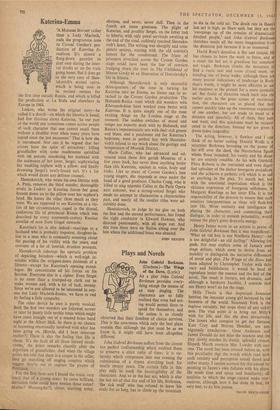Katerina-Emma
'A MADAME BOVARY rather
Leskov, who wrote the original story—he called it a sketch—on which the libretto is based, had few illusions about Katerina. 'In our part of the world one sometimes comes across people of such character that one cannot recall them without a shudder even when many years have lapsed since the last encounter.' That is how she is introduced. Nor can it be argued that her crimes have the spice of attraction: killing grandfather with some mushrooms sprinkled with rat poison; murdering her husband with the assistance of her lover, Sergei; asphyxiating her weakling nephew with a pillow; and finally drowning Sergei's newly-found tart. It's a list which would daunt any defence counsel.
Shostakovich, who wrote his own libretto with A. Preis, removes the third murder, thoroughly erotic in Leskov as Katerina forces her great breasts down on to the pillow over her nephew's head. He leaves the other three much as they were. We are supposed to see Katerina as a vic- tim of her circumstances, caged in the dismal, cankerous life of provincial Russia which was described by every nineteenth-century Russian novelist of note from Gogol onwards.
Katerina's lot is dire indeed—marriage to a husband who is probably impotent, daughter-in- law to a man who is constantly moaning about the passing of his virility with the years, and overseer of a lot of boorish, drunken peasants.
Shostakovich sidesteps the operatic problem of depicting boredom—which is well-nigh in- soluble within the stripped-down demands of a libretto—except for Katerina's opening mono- logue. He concentrates all his forces on his heroine. Everyone else is a cipher. Even Sergei is no more than a trumped-up clerk out to make women and, with a bit of luck, money. Since we're not allowed to be interested in any- one but Lady Macbeth-Emma, we have to end by feeling a little sympathy.
The other device he uses is purely musical. Both the first two murders are followed sooner or later by jaunty little urchin tunes which might have come straight out of a massed brass band night at the Albert Hall. So there is no chance of becoming emotionally involved with what has been going on. (Brecht, did I hear someone mutter?) There is also the feeling that life is cheap. 'It's the fault of all those blasted mush- rooms,' the priest remarks cheerily after the departure of grandfather. And when the village police are told that there is a corpse in the cellar, they go marching off singing couplets which suggest they're out to capture the pirates of Penzance.
For the first three acts I found the music very much that of a young man: by turns brilliant, derivative (who could have written those notes? Mahler? Mussorgsky?), clever, startling, noisy,
obvious, and never, never dull. Then in the fourth act came greatness. The plight of Katerina, and possibly Sergei, on the bitter trek to Siberia, with only penal servitude awaiting at the end of the road, suddenly touched Shostako- vich's heart. The writing was abruptly and com- pletely serious, starting with the old convict's lament for the condemned. The frieze of prisoners stretched across the Covent Garden stage could have been the line of convicts trudging down the river in The Childhood of Maxim Gorky or an illustration of Dostoievsky's life in Siberia.
Although Shostakovich is only successful three-quarters of the time in turning his Katerina into an Emma, no blame can be at- tached to the Covent Garden production. The Habunek-Rasica team which did wonders with Khovanshchina have worked even better with Katerina. It is quite simply one of the most exciting things on the London stage at the moment. The sudden switches of mood and tempo are expertly dealt with by Habunek, and Rasica's impressionistic sets with their rich greens and blues, and a passionate red for Katerina's bedroom, were in perfect key with Shostako- vich's refusal to say much about the geology and temperature of Mtsensk District.
Marie Collier, who has advanced and ad- vanced since those first garish Musettas of a few years back, has never done anything better than this Katerina, opulent in voice, body and looks. Like so many of Covent Garden's best young singers, she responds at once under the hand of a good producer. Charles Craig, who is billed to sing opposite Callas at the Paris Opera next summer, was a strong-voiced Sergei who made no attempt to characterise a characterless part, and nearly all the smaller roles were ad- mirably done.
Shostakovich, to judge by his glee on both the first and the second performance, has found the right conductor in Edward Downes, who directed passionately, with all stops out. And this time there were no Stalins sitting over the box where the additional brass was situated.
JOHN HIGGINS






































 Previous page
Previous page